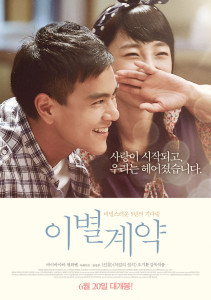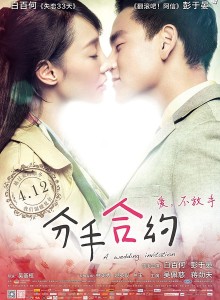A Wedding Invitation
分手合约
China/South Korea, 2013, colour, 2.35:1, 103 mins.
Director: Oh Gi-hwan 오기환 | 吴基桓.
Rating: 7/10.
Jolting mix of rom-com and weepie does boast a terrific lead in Mainland actress Bai Baihe.
Beijing, autumn 2012. Five years earlier, on 16 Sep 2007, He Qiaoqiao (Bai Baihe) suddenly split up with her longtime boyfriend Li Xing (Peng Yuyan), whom she’d known since high-school days, and moved to Shanghai to pursue her career and further studies. She had always dreamed of becoming a famous designer and marrying in a designer wedding dress; he had dreamed of becoming a celebrity chef. Before leaving, He Qiaoqiao wrote out an “agreement” between them, sealed with their thumbprints: if they were both still single after five years, then they could marry. Now He Qiaoqiao is a well-known designer of ceramic tableware and Li Xing is about to represent China in the TV show King of Cuisine:  Asian Challenge. He Qiaoqiao, who’s remained single, tells her best pal, gay Maomao (Jiang Jinfu), about the contract and how she’s confident Li Xing will call her soon. But when he does, it is to tell her that he’s getting married in two weeks’ time to Zhou Rui (Wu Peici), daughter of his boss. Astonished, but feigning good wishes, He Qiaoqiao immediately flies to Beijing, where Li Xing introduces her to Zhou Rui, who grew up in France. Zhou Rui befriends her and He Qiaoqiao plays along, going with them to choose the bridal dress and even agreeing to stay in the luxurious new flat the couple are going to move into after their marriage. One evening, she goes on the offensive, and tries to seduce Li Xing, but he fends her off. When he suggests a dinner with old college friends, He Qiaoqiao gets Maomao to fly up from Shanghai and pretend to be her boyfriend. Finally, she decides to accept the inevitable and return to Shanghai. Before she goes, however, Li Xing suggests they have a final dinner together.
Asian Challenge. He Qiaoqiao, who’s remained single, tells her best pal, gay Maomao (Jiang Jinfu), about the contract and how she’s confident Li Xing will call her soon. But when he does, it is to tell her that he’s getting married in two weeks’ time to Zhou Rui (Wu Peici), daughter of his boss. Astonished, but feigning good wishes, He Qiaoqiao immediately flies to Beijing, where Li Xing introduces her to Zhou Rui, who grew up in France. Zhou Rui befriends her and He Qiaoqiao plays along, going with them to choose the bridal dress and even agreeing to stay in the luxurious new flat the couple are going to move into after their marriage. One evening, she goes on the offensive, and tries to seduce Li Xing, but he fends her off. When he suggests a dinner with old college friends, He Qiaoqiao gets Maomao to fly up from Shanghai and pretend to be her boyfriend. Finally, she decides to accept the inevitable and return to Shanghai. Before she goes, however, Li Xing suggests they have a final dinner together.
REVIEW
Co-produced by South Korean major CJ Entertainment, directed, shot, edited and scored by South Koreans, but set in China with all-Chinese cast, A Wedding Invitation 分手合约 is a curious mixture beyond just its on- and off-screen participants. For its first few minutes it looks like being a charming romance, then abruptly changes into a wacky rom-com for the next hour, and finally turns into a fully-fledged weepie for the remaining 30 minutes or so.
Culturally, too, the film keeps sliding back and forth between China and South Korea in feel. Though the very smooth photography and editing are always more reminiscent of the latter, 45-year-old director Oh Gi-hwan 오기환 | 吴基桓 (whose occasional films include at least one slick rom-com, The Art of Seduction 작업의 정석, 2005) manages to give the movie a convincing local feel in its middle section, with excellent chemistry between fast-rising Mainland actress Bai Baihe 白百何 and Taiwan’s Peng Yuyan 彭于晏 [Eddie Peng], as the two lovers who can’t seem to make the final stage to the altar. But the last section, which suddenly introduces a surprise element and largely ditches any comedy, is pure South Korean melodrama in look, feel and even locations (such as a cute backstreets coffee house). Bai and Peng end up looking as if they’re two Chinese characters marooned in an alien filmic landscape.
That’s a shame, as, until the hour mark, Wedding is a terrific example of one of China’s new hit genres, the rom-com. As the somewhat spacey young Beijinger He Qiaoqiao, who suddenly ups and offs to Shanghai, promising to marry her longtime boyfriend if they’re both still single after five years, Bai, 29, more than fulfils the promise she’s shown in other rom-coms The Law of Attraction 万有引力 (2011) and First Time 第一次 (2012), and especially in her lead role in the hit Love Is Not Blind 失恋33天 (2011). She’s equally good at He Qiaoqiao’s mercurial moods as she is at her serious side, and gets good support from both Peng (who, at 31, is slowly starting to show signs of leading-man status) as her boyfriend and Jiang Jinfu 蒋劲夫 as her gay Shanghai soulmate. The characters are all cliches, the central premise is a total construct, and Peng’s uninflected playing (compared with Bai’s) slightly gives the game away. However, director Oh gets the chemistry and fluffy rom-com tone just right, the dialogue is well written, and the results are likeable and highly entertaining.
The final half-hour or so is equally well constructed on a technical side, and does manage some emotional pull thanks to the the strength of the relationships built up until then. But the switch from glossy rom-com to glossy weepie betrays the viewer’s emotional investment in the film to that point – as well as throwing away its strongest cards. The movie still earns an extra point for Bai’s overall performance, but the reasons for the sudden change in tone remain mystifying.
The rest of the cast don’t get much of a look-in, with only Taiwan actress-model Wu Peici 吴佩慈 (Go Lala Go! 杜拉拉升职记, 2010; Lost in Panic Room 密室之不可告人, 2010) making an elegant but brief impression as the super-sweet fiancee of Peng’s character. Her compatriot Lin Meixiu 林美秀 also pops up in a motherly role.
Befitting the genre, settings are all New China urban luxurious, glossily shot by South Korean d.p. Gim Yeong-ho 김영호 | 金荣号 and designed by Malaysian-born Jiang Hanlin 江汉林 [Jeffrey Kong]. Wedding dresses by well-known Beijing designer Lan Yu 兰玉 (who cameos) get a major plug in the film. Apart from the late-developing subplot, the film bears no relation at all to Oh’s South Korean melodrama Last Present 선물 (2001), of which Wedding was earlier said to be a remake. The Chinese title literally means “The Break-Up Agreement”; the film’s Korean title is 이별계약, which means the same.
CREDITS
Presented by Beijing Century Media International Advertising (CN), CJ Entertainment (SK), Beijing C2M Media (CN), Youneng Investment Partners (CN), Beijing Shiji Lecheng Media (CN), China Film (CN). Produced by Beijing Century Media International Advertising (CN), CJ Entertainment (SK), Beijing C2M Media (CN), Beijing Shiji Lecheng Media (CN).
Script: Qin Haiyan, A Mei, Guo Feifei, Choi Han-gi. Photography: Gim Yeong-ho. Editing: Shin Min-gyeong. Music: Yi Ji-su. Production design: Jiang Hanlin [Jeffrey Kong]. Costumes: Gim Shi-jin. Sound: Liu Lixin, Yi Seung-yeop. Visual effects: Gim Byeong-rae (CJ Powercast).
Cast: Bai Baihe (He Qiaoqiao), Peng Yuyan [Eddie Peng] (Li Xing), Wu Peici (Zhou Rui), Jiang Jinfu (Maomao), Lin Meixiu (Li Xing’s mother), Lan Yu (wedding-dress designer), Zhao Yingjun (Li Xing’s friend), Xi Shouchen (top gourmet).
Release: China, 12 Apr 2013; South Korea, 20 Jun 2013.
(Review originally published on Film Business Asia, 10 May 2013.)
